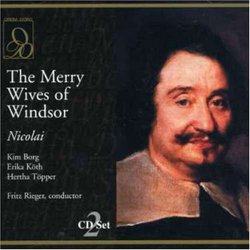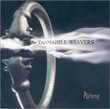| All Artists: Nicolai, Borg, Koth, Topper, Rieger Title: Merry Wives of Windsor Members Wishing: 0 Total Copies: 0 Label: Opera D'oro Original Release Date: 1/1/1967 Re-Release Date: 5/7/2002 Album Type: Live Genre: Classical Style: Opera & Classical Vocal Number of Discs: 2 SwapaCD Credits: 2 UPC: 723724396524 |
Search - Nicolai, Borg, Koth :: Merry Wives of Windsor
CD DetailsSimilarly Requested CDs
|
CD ReviewsLively performance William S. Levison | Valdosta, GA United States | 08/31/2004 (4 out of 5 stars) "Nicolai's version of the Shakespearian comedy of the same name, stylistically apposite to Verdi's far more famous "Falstaff," is a delightful bel-canto opera in its own right. An exciting version of the famous overture sets the tone for the opera proper. The singing ranges from the so-so (Kim Borg's rather rough Falstaff) to the virtuostic (much of the coloratura of the several sopranos' florid music), but all seem to be enjoying themselves immensely. If, as the otherwise uninformative notes state, this is a live performance, the sound is amazing: not a peep from the audience, and no applause. As this appears to be the only currently available complete recording, it is a true bargain." Sir John in love ... German style L. E. Cantrell | Vancouver, British Columbia Canada | 06/17/2008 (5 out of 5 stars) "SOURCE:
Live 1967 broadcast performance. SOUND: Generally quite decent broadcast-quality mono with a couple of minor instances of overload. CAST: John Falstaff, knight and fat buffoon - Kim Borg (bass); Frau Fluth, one of the women of the Town of Windsor [Shakespeare's Alice Ford] - Erika Köth (soprano); Herr Fluth, a jealous gentleman of Windsor [Shakespeare's Ford] - Hans Günter Nöcker (baritone); Frau Reich, another woman of Windsor [Shakespeare's Meg Page] - Hertha Töpper (mezzo-soprano); Herr Reich [Shakespeare's Page] - Hans Christian Kohn (baritone); Anna, his daughter [Shakespeare's Anne Page] - Eva Maria Rogner (soprano); Fenton, Anna's choice as her husband-to-be - Naan Pöld (tenor); Dr. Caius, Frau Reich's choice for her son-in-law - Unidentified (bass); Slender, a rich young man favored by Herr Reich as his son-in-law - Unidentified (tenor). CONDUCTOR: Fritz Rieger with the Bavarian Radio Symphony and Chorus. DOCUMENTATION: Typical Od'O package. No libretto. Brief, generic history of the opera and summary of the plot. Track listing. COMMENTARY: Carl Otto Nicolai (1810-1849), like his rough contemporaries, Carl Maria von Weber (1786-1826), Franz Schubert (1797-1828) and Felix Mendelssohn-Bartholdy (1809-1847), was a musical meteor who blazed across the early years of the 19th Century only to disappear suddenly at his brightest. Nicolai was the son of a Prussian musician. At an early age, he displayed great talent at the keyboard, a fact that unfortunately led his father to fancy himself as Leopold Mozart reborn. Things came to such a pass in the Nicolai family that young Otto ran away from home at the age of sixteen. He quickly found his own way in the world, composing his first symphony at the age of twenty. He soon landed the prominent job of organist for the Prussian Embassy at Rome. He also began his life-long career as a conductor. At age 29, still based in Rome, he composed the first of his six operas. (Among the six are "Il templario," based on "Ivanhoe," and "Il proscritto," based on a libretto originally intended for Verdi.) In his thirties, he returned to the German-speaking lands. In Berlin, he succeeded Mendelssohn as Kapellmeister for the Berlin Cathedral. In Vienna, although his Prussian background sometimes made him an unpopular outsider, he was appointed conductor at the Municipal Opera (Hofoper). Berlioz encountered him in Vienna and greatly admired him both as conductor and composer. In 1842, Nicolai became the founder and first conductor of the Vienna Philharmonic Orchestra. In 1849, he premiered his best-known work, "The Merry Wives of Windsor" ("Die Lustigen Weiber von Windsor"). Two months later, Nicolai was appointed Conductor of the Berlin Opera, where, two days after that and just short of his 39th birthday, he died of a stroke. Although outshone by the brilliance of Verdi's operatic version of Shakespeare's "The Merry Wives of Windsor," Nicolai's "Die Lustigen Weiber von Windsor" is good enough to remain a standard repertory piece in Germany and Austria and to sit just at the edge of the standard repertory in the rest of the world. There are a handful of recorded performances currently in circulation. To the best of my knowledge, there are no bad ones. Arrigo Boito's libretto for Verdi took great liberties with "The Merry Wives," massively beefing up the character of Falstaff by importing material from the Bard's "Henry IV" plays. Solomon Mosenthal's libretto, on the other hand, adheres more closely to the plot of the original play, and is the weaker for it. It is further weakened by the dismissal of Falstaff's scruffy and unreliable henchmen, Bardolph, Pistol and Nym--as well as the elimination of Mistress Quickly. "Die Lustigen Weiber," then, is simply a tale of young romance wrapped around the schemes of a foolish old fat man, a serviceable comedy, but no more. Shakespeare's play is something odd among his plays. It is the most prosaic of the Bard's works, both in language and plot. Ostensibly set early in the reign of King Henry V, in fact, immediately after Falstaff's cruel dismissal by the new king, it is nevertheless plainly--and uniquely--about Elizabethan England. Sir John is, himself, a pallid caricature of the great Falstaff in the "Henry IV" plays, now merely an over-confident old fool instead of the source and soul of the world's wit. One of the oldest recorded anecdotes about Shakespeare has it that Queen Elizabeth, having been delighted with the old reprobate, told Shakespeare she wanted to see Sir John in love, and gave the playwright just two weeks to produce him. When an absolute autocrat such as the great Queen makes an idle request, it ranks, of course, as an imperial edict. This has led some to speculate that the desperate Shakespeare must have snatched up some old, forgotten (and now wholly lost) farce, one constructed somewhat along the lines of Jonson's later "Volpone," and hurriedly stuffed a few rough fragments of the fat old knight into it to strut and fret before the Queen and her glittering court, probably at Windsor. Perhaps that is what actually happened ... or perhaps not. This set under current consideration offers a good and lively performance, albeit slightly on the rough and ready side. The cast is a strong one with which I can't find objective fault, although it does not quite match my own personal and quite idiosyncratic ideal. The excellent Erika Köth seems to me to be just a little too youthful and bright as Frau Fluth/Alice Ford. I think Hertha Töpper too matronly as Frau Reich/Meg Page, although I'd happily cast her as the sadly absent Dame Quickly. I would hope for just a little more youthful ardor from Naan Pöld as Fenton. But these are purely personal nitpicks, not criticisms. This is an excellent and inexpensive version of a fine comic opera that is a true delight from beginning to end. It begins with a famous and glorious old warhorse of an overture and contains several delightful pieces in the Weber-inspired German Romantic style (not Italian bel canto as has been suggested elsewhere.) Five joyous stars." |






